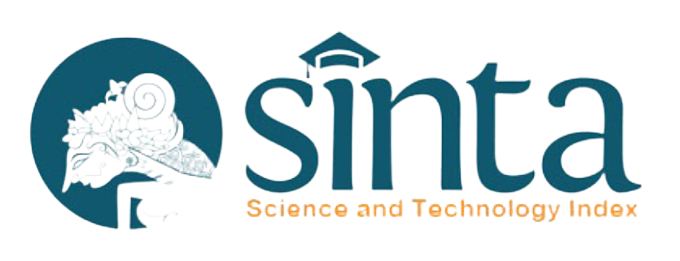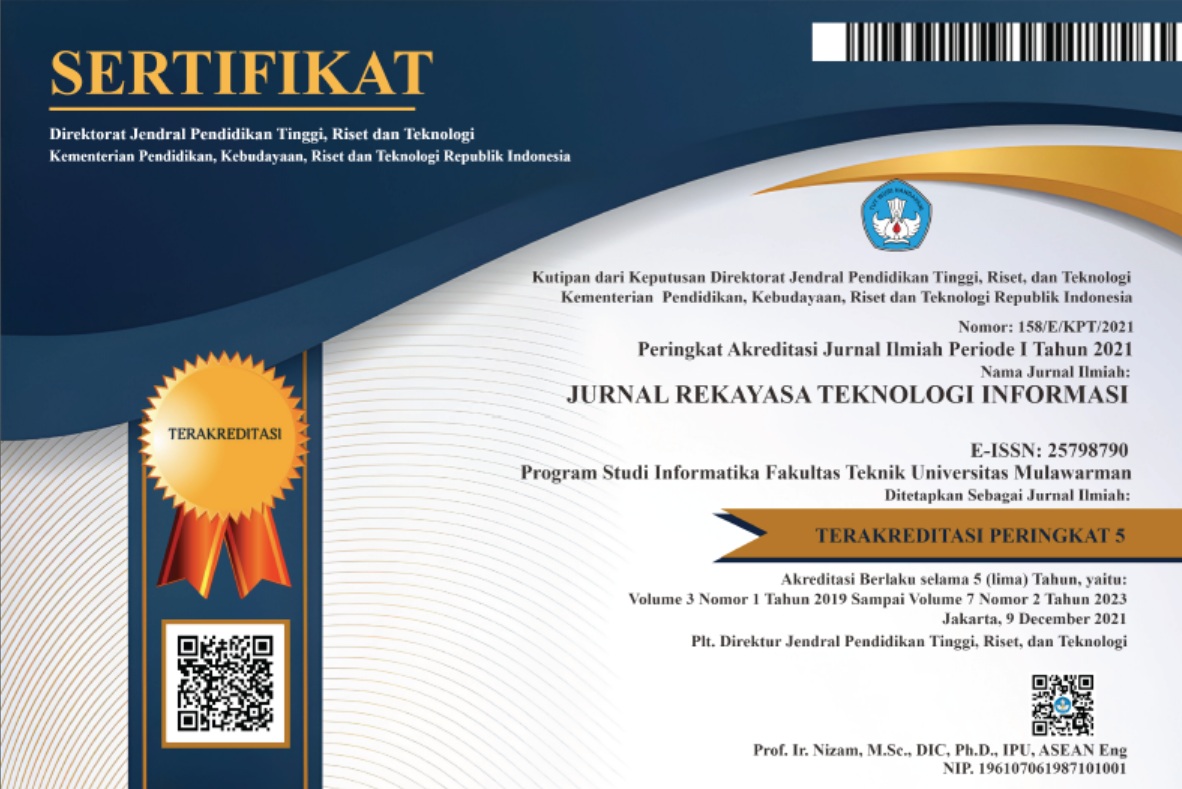Prediksi Penjualan Produk Menggunakan Algoritma Xtreme Gradient Boosting
Abstract
Keywords
Full Text:
PDFReferences
D. Suparman, “Pengaruh Harga Dan Kualitas Pelayanan Terhadap Penjualan Spare Part Motor Di Pt. Slm (Selamat Lestari Mandiri),” J. Ekon., vol. Vol. 07 No, no. 2, p. 2, 2018.
Hartatik et al., Data Science for Business (Pengantar dan Penerapan Berbagai Sektor), no. May. 2023.
P. Dankorpho, “Sales Forecasting for Retail Business using XGBoost Algorithm,” J. Comput. Sci. Technol. Stud., vol. 6, no. 2, pp. 136–141, 2024, doi: 10.32996/jcsts.2024.6.2.15.
D. Y. Y. Sim and Z. Wei, “XGBoost Regression Algorithms for Efficient Predictions on Inventory Sales and Management,” no. September, pp. 66–71, 2024, doi: 10.1109/eeet61723.2023.00033.
R. Siringoringo, R. Perangin-angin, and M. J. Purba, “Segmentasi Dan Peramalan Pasar Retail Menggunakan Xgboost Dan Principal Component Analysis,” METHOMIKA J. Manaj. Inform. dan Komputerisasi Akunt., vol. 5, no. 1, pp. 42–47, 2021, doi: 10.46880/jmika.vol5no1.pp42-47.
A. Alfani W.P.R., F. Rozi, and F. Sukmana, “Prediksi Penjualan Produk Unilever Menggunakan Metode K-Nearest Neighbor,” JIPI (Jurnal Ilm. Penelit. dan Pembelajaran Inform., vol. 6, no. 1, pp. 155–160, 2021, doi: 10.29100/jipi.v6i1.1910.
Ab. Bin Tayyab and M. F. Nasim, “Walmart Sales Prediction Using Machine Learning Algorithms,” Ann. Rom. Soc. Cell Biol., vol. 25, pp. 7872-7882–7872 – 7882, 2024.
F. Riza, “Analisis dan Prediksi Data Penjualan Menggunakan Machine Learning dengan Pendekatan Ilmu Data,” Data Sci. Indones., vol. 1, no. 2, pp. 62–68, 2022, doi: 10.47709/dsi.v1i2.1308.
M. Riyyasy, Azfa, Rasikh, W. Aghniya, Nouval, and H. Tantyoko, “Penerapan Algoritma Machine Learning Untuk Memprediksi Term Deposit Nasabah Perbankan,” J. Inform. Inf. Technol., vol. 2, no. 3, pp. 145–156, 2023.
N. Ambari, N. Puspitasari, and A. Septiarini, “Prediction of Budget Planning Using The Long Short Term Memory,” J. Artif. Intell. Softw. Eng., vol. 5, no. 1, pp. 116–125, 2025.
D. L. Yuliani, N. Mulyatini, and E. Herlina, “ANALISIS MATERIAL REQUIREMENT PLANNING DAN MANAJEMEN RANTAI PASOKAN DALAM MENINGKATKAN KEUNGGULAN BERSAING (Suatu Studi Pada …,” … Entrep. J., vol. 1, no. September, pp. 32–46, 2019.
S. E. Herni Yulianti, Oni Soesanto, and Yuana Sukmawaty, “Penerapan Metode Extreme Gradient Boosting (XGBOOST) pada Klasifikasi Nasabah Kartu Kredit,” J. Math. Theory Appl., vol. 4, no. 1, pp. 21–26, 2022, doi: 10.31605/jomta.v4i1.1792.
K. Li, “A Sales Prediction Method Based on XGBoost Algorithm Model,” BCP Bus. Manag., vol. 36, pp. 367–371, 2023, doi: 10.54691/bcpbm.v36i.3487.
D. Riando and A. Afiyati, “IMPLEMENTATION OF XGBOOST ALGORITHM TO PREDICT THE SELLING PRICE OF CAYENNE PEPPERS IN,” vol. 4, no. 09, pp. 741–749, 2024.
S. Priadana and D. Sunarsi, METODE PENELITIAN KUANTITATIF. 2021.
D. T. Larose and C. D. Larose, Discovering Knowledge in Data: An Introduction to Data Mining: Second Edition, vol. 9780470908. 2014.
K. Abdullah et al., Metodologi Penelitian Kuantitatif, vol. 3, no. 2. 2021.
X. Dairu and Z. Shilong, “Machine Learning Model for Sales Forecasting by Using XGBoost,” 2021 IEEE Int. Conf. Consum. Electron. Comput. Eng. ICCECE 2021, no. Iccece, pp. 480–483, 2021, doi: 10.1109/ICCECE51280.2021.9342304.
A. Wibowo, “Analisa Dan Visualisasi Data Penjualan Menggunakan Exploratory Data Analysis Pada PT. Telkominfra,” JATISI (Jurnal Tek. Inform. dan Sist. Informasi), vol. 9, no. 3, pp. 2292–2304, 2022, doi: 10.35957/jatisi.v9i3.2737.
F. Bolikulov, R. Nasimov, A. Rashidov, F. Akhmedov, and Y. I. Cho, “Effective Methods of Categorical Data Encoding for Artificial Intelligence Algorithms,” Mathematics, vol. 12, no. 16, 2024, doi: 10.3390/math12162553.
D. Arisandi, S. Salamun, and A. R. Putra, “Prediksi Penerimaan Siswa Baru dengan Metode Single Exponential Smoothing Melalui Metrik Evaluasi MAD, MSE dan MAPE,” J. Inf. Syst. Res., vol. 4, no. 4, pp. 1197–1204, 2023, doi: 10.47065/josh.v4i4.3658.
A. M. M. Fattah, A. Voutama, N. Heryana, and N. Sulistiyowati, “Pengembangan Model Machine Learning Regresi sebagai Web Service untuk Prediksi Harga Pembelian Mobil dengan Metode CRISP-DM,” JURIKOM (Jurnal Ris. Komputer), vol. 9, no. 5, p. 1669, 2022, doi: 10.30865/jurikom.v9i5.5021.
DOI: http://dx.doi.org/10.30872/jurti.v9i1.20419
Refbacks
- There are currently no refbacks.
Copyright (c) 2025 Jurnal Rekayasa Teknologi Informasi (JURTI)

This work is licensed under a Creative Commons Attribution-ShareAlike 4.0 International License.
Alamat Redaksi :
Program Studi Informatika
Fakultas Teknik
Jl. Sambaliung No. 9 Kampus Gunung Kelua Samarinda 75119 - Kalimantan Timur
e-mail : jurti.unmul@fkti.unmul.ac.id
Url : http://e-journals.unmul.ac.id/index.php/INF
Contact Person : Medi Taruk [081543438301]
This work is licensed under a Creative Commons Attribution-ShareAlike 4.0 International License.









